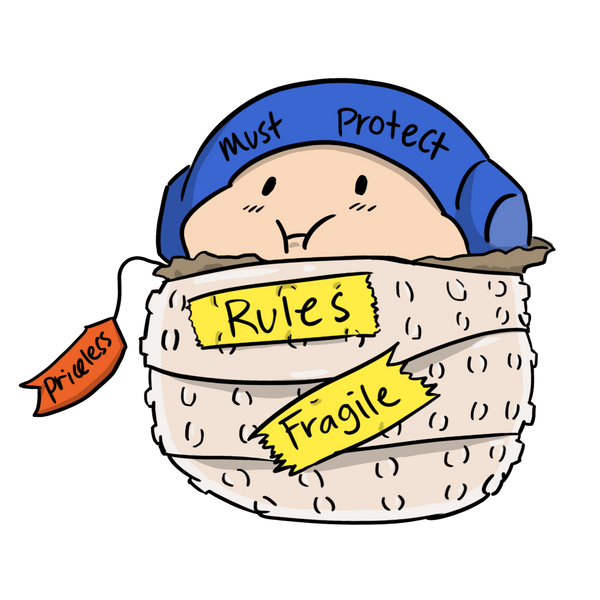

· By Codomo Singapore
It's Never Too late: How To Start Teaching Cybersecurity To Kids
Children are prone to cyberattacks as much as we are, perhaps even more so given their lack of knowledge on how to keep safe on the internet. So, it is important to equip them with one protection: cybersecurity.
Perhaps we laugh about it, since—unlike adults—children have no financial income to be scammed (but their parents surely do). Also, they almost have no dirty little secrets to be blackmailed. For 7-year-old kids, eating chocolate without parents’ permission already feels like committing a crime.
The thing is, children still have so many issues to learn about the world. Yes, as they grow older, they’ll understand more, but the problem is the digital world can’t wait.
Kids are digital na(t)ives
Children nowadays are purely digital natives, they know how to operate YouTube first hand before they can even read. On the other hand, they’re also naive. They dive into the internet without understanding what is at stake.
If they are unaware of cybersecurity in their early years, they will be vulnerable in their teenage years and on. It makes them a hot target for cyberattacks.
Understanding cybersecurity becomes more urgent especially during the pandemic since kids spend most of their time online. They are more active on social media, online games on Google, PlayStation, or other sources, and hopefully a bit of homework time.
This is no joke, a recent study said, children between the ages of 8-18 spend roughly 7 hours 40 minutes a day online. That's almost a third of their day and almost the same hours we spend at work.
Yet, given that schools have been increasingly raising awareness cybersecurity, you might be tempted to think that your children are now proficient in keeping themselves safe.
However, keep in mind that school talks may give them information on how to protect themselves, but may not be the most effective in helping them to internalise the concepts behind them. Cybersecurity games like Enter The Spudnet can help children understand the critical concepts relating to cybersecurity. You know what they say- the first step to protection is awareness.
Encourage your child to protect themselves and Enter The Spudnet safely!

So, what’s the risk?
To give you a real picture of how things may go wrong, I can give you one example case of a cyber attack that happened in the US.
A 12-year-old boy named Wilson had to endure cyberbullying for 10 months since his PlayStation account was hacked. This fact is a shock for some people because cyberbullying in social media is common, but not from online games or Netflix!
The hacker destroyed all his games and constantly sent intimidating messages that interrupted their Netflix movies. It’s seriously terrifying as they watched the movie, a message would pop up saying, “if you promise to kill yourself I’ll stop”.
At some point, the continuous cyberattacks made Wilson think about suicide!
It didn’t stop there, though. Wilson’s remote learning was disrupted and forced him to move school. Even the school officials, law enforcement officials, and internet providers couldn’t find the hacker nor stop the cyberbullying.
Ten months later, the hacker sent a message saying he or she would stop hacking Wilson’s accounts because “my mom caught me hacking you”. The message also said, “She told me to apologize. I’m sorry for hacking you”. Case closed, the hacker never came to justice.
So yes, the digital world IS as scary as the real world. The threats are real…
Cyberthreats increase during the pandemic
A study revealed that there has been a 70% increase in the amount of bullying or hate speech among teens and children in the month since the Covid lockdown began.
Another study showed that children aged 10-16 years who accessed cyberbullying or violent content had up to 50% higher risk for thoughts of suicide.
Please keep in mind that not only cyberbullying, kids are also vulnerable to cyber predators, identity theft, phishing, scams, and many others. Children are being exposed to the same cyberthreats adults experience every day. The cyberattack techniques used by cybercriminals are the same.
Kids who don’t know how to keep themselves cyber secure are vulnerable to losing their information, their identity, and their money. This is why, as a parent, you need to take action and walk the talk about cybersecurity to your children, ASAP.
Essential tips to teach cybersecurity to your kids
Build an understanding

Depending on the age, you may need to adjust the way you converse with them. The younger your children’s age is, the less “computing language” you should use.
Make your kids understand what’s at stake when they’re online. Let them know the threats—how cybercriminals are likely to target them, and how that will affect their lives.
Cybercriminals will use sly tactics to steal sensitive information such as passwords (like what happened to Wilson), personal information such as address or phone number, or in fact money.
Most children have never considered those cyber threats before. Hence, building an understanding of why cybersecurity matters, they are more likely to take the necessary steps to protect themselves, both online and offline.
Don't forget to help your kids understand the importance of setting passwords that are both easy to remember and strong where it is less susceptible to hacking. Check this guide on how to stay safe on the internet: "How Cyber Savvy Are You?"
Gear them up with protection rules

The digital world doesn’t need to be a scary place for you and your kids. Yes, I know I’ve been brainwashing you about how terrifying cyber threats are, but honestly, we can barely live without the internet.
What you can actually do is to make the internet a safer place for them by setting up ground rules.
When they are at a younger age, you can keep the rules simple and easy to follow, for instance:
- Deciding certain screen time per day and sticking to it
- Limiting the apps they can access (e.g. YouTube or web browser with filtered search setting according to age)
- Always asking permission before downloading anything online
As they grow older, you may need to discuss the rules further to accommodate their digital life. At least, the guidance should cover these:
- Building knowledge in generating strong and authentic passwords ideas
- Taking serious consideration when sharing personal information online
- Avoiding low-quality apps with plenty of advertisements and suspicious pop-ups or messages
Be digital “companion” rather than “controller”

Children feel safer when they know that their parents will always have their back if they ask for help. If parents are able to play the role of a digital companion, kids are more likely to come forward. I know it’s not easy, but it’s also not impossible.
Ideally, the set of rules are meant to protect kids online. In reality—or virtually—things can go wrong even though you already make some precautions.
Let’s say your kids break one rule of online behavior that leads them to fall for phishing or scam. Instead of blaming them, you should try to solve the problem together.
Let your kids know that the most important thing for you is their safety. If something goes wrong, try to find positives that you can both learn from.
And most importantly, you must walk the talk. Children are likely to copy their parents’ behavior. So you have to be a good role model by making sure your own online behaviors are safe and responsible.
Equip your family with internet knowledge

Parents wish with one or two talking sessions the kids will comprehend and adopt cybersecurity skills at once. In fact, it’s a continuous journey because technology is dynamic and evolving, along with its risks.
That makes it more crucial than ever for children to have a strong “theoretical grounding” about the internet and computer science, of course in a fun way!
There are plenty of child-friendly educational resources on websites, YouTube, or in the form of ebooks.
But if you’re not sure where to start, try out our board game Potato Pirates: Enter The Spudnet. This is a board game for the family, suitable for parents and kids activities.
It will make your parenting much easier when welcoming your kids to the cyber world. It covers concepts of how the internet works such as encryption, proxies, firewalls, packets, and intranet while highlighting common cyber threats and cyber attacks such as malware, DDOS, and more. They can also develop a deep understanding of how to stay safe on the internet.
Most importantly, you don’t need any cybersecurity or computing background to enjoy Potato Pirates: Enter The Spudnet or our other board games with your kids (in fact, you don’t even need a computer to play!). Not only that, these thinking games help to improve their executive functioning skills!
It’s perfect for family game time that is both exciting and educational!
Closing remark
Just for a reminder, a board game for family or any other tools can indeed help kids to build a strong understanding of cybersecurity, but nothing will replace an open dialog between you and your kids.
The best foundation to protect your children against cyberthreats is to make them comfortable talking about what is going on in their lives online and in real life. Therefore, you can protect your kids from cyberattacks better and gain their trust without asking for it.
Before you leave, check out our blog posts to find other parenting 101 hacks like these two articles:
"5 Ways To Improve Your Child's Motor Skills"
"Is it Possible for Kids to Learn Coding with Games if They Don’t Have a Computer?"

